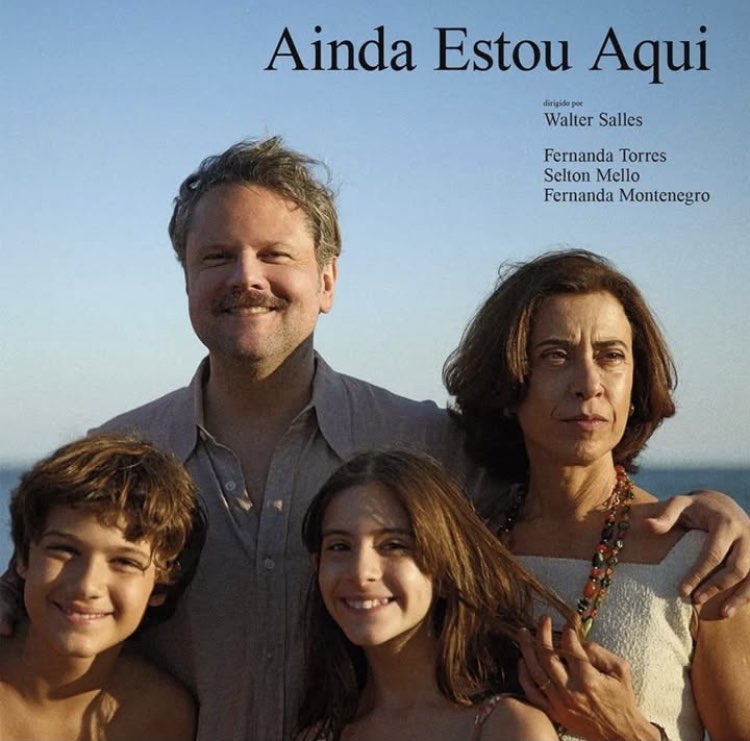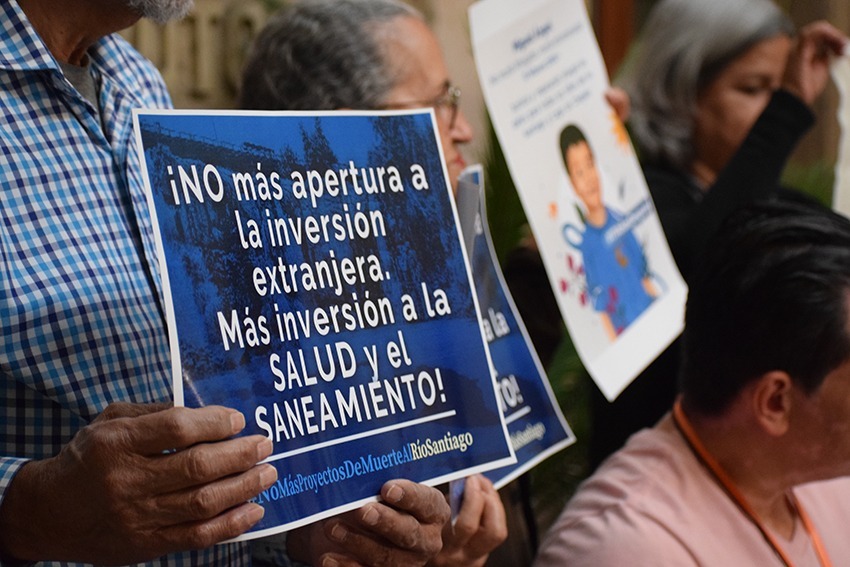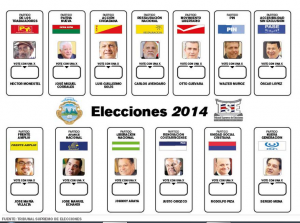 An interview with Maria Florez-Estrada
An interview with Maria Florez-Estrada
The results of the Feb. 2 elections in Costa Rica fell like a bucket of cold water on the left in the Central American nation. Confident of achieving at least a second-place finish that would carry them to a run-off in April, instead the candidate of the left-of-center Broad Front, José Maria Villalta, came in third, leaving him out of the running. According to the final tally, Villalta received only 17.3% of the vote, compared to 29.7% for the official candidate, Johnny Araya of the National Liberation Party (PLN) and a surprising 30.6% for the candidate of the Citizen Action Party (PAC), Luis Guillermo Solís.
Just weeks before election day, polls showed Villalta in the lead, while Solís barely figured in the competition. His victory shook up Costa Rican politics. In another unexpected move, on March 5 Araya withdrew from the run-off set for April 6, leaving Solis with a straight shot to the presidency.
The Americas Program talked to Maria Florez-Estrada, legislative adviser to the Broad Front and communications coordinator for Villalta’s campaign, for her take on what happened and what the elections mean for the future of Costa Rica. Florez-Estrada is a long-time politician, activist and feminist. She emphasized the pitfalls of the electoral process, along with a healthy dose of self-criticism.
AP: Let’s start with the obligatory question: the results of Feb. 2 were a surprise, according to the polls. What’s your reading on what happened?
MFE: We think that it had a lot to do with the fear campaign launched against the Broad Front, a campaign based on trying to present us as a communist party, a party against foreign investment, and that was going to close down jobs and businesses. There were transnationals like Avon, Subway and other companies that pressured their employees to vote against the Front–the Supreme Electoral Tribunal even ruled on the matter, saying it was crime because election laws prohibit threatening or coercing workers to vote or not vote in a particular way. There was a business campaign in some sectors against the candidate of the Broad Front.
Then there was also a campaign on the part of the Catholic and evangelical churches, to the point of calling on people not to vote for parties that, textually, “promoted abortion”. Something that obviously the Broad Front does not do, “promote abortion”, but yes, for example, in its platform it calls for maintaining the current legislation that allows abortion in the case of danger to a mother’s life and also for opening discussion on what to do in cases where a woman who was raped aborts, because currently it’s punished with prison. There was a huge campaign concentrated on these issues and that affected us.
We also made some mistakes. What happened is that in spite of the polls that always placed us in first or second place and going into the second round, in all the polls there was always a large number of undecided voters. And in the last stretch of the campaign those undecided voters voted en masse for an alternative with little visibility, seemingly little support, but who began to be spotlighted by the media that were against the Broad Front. For them, the PAC was the lesser of two evils. We had considered the PAC an ally for being a progressive party in some respects, but in the last stretch they joined the attack against us, in the same sense as the traditional parties. All these elements came together so that an important part of the electorate went to the PAC at the last minute.
Even so, the result for the Broad Front is historic. Never has a party of the left, progressive, feminist, ecologist–all the identities of the Broad Front–had so high a vote and never before had it won nine seats in the legislature like now.
AP: What’s behind the withdrawal of the candidate of the National Liberation Party, Jonny Araya, from the presidential race?
MFE: Araya and the PLN’s official version is that four polls showed that it would be very difficult for him to beat Solís. And that is the reason for his withdrawal. However, I think that with this move the PLN is looking to achieve two aims: first, to avoid, indeed, a really bad result on April 6 that would put it in a position of extreme weakness vis a vis other political forces and, second, to contribute to an increase in abstention, which is always greater in the run-off, so that the PAC wins with little legitimacy. That way there will always be a doubt about how much support Solis really has and also how much the PLN has. In that case, the only point of reference on the popular vote for the candidates of both parties would be the results of the first round.
I think there are signs, also, that the PAC is in conversations with the PLN for what they call “an orderly transition”. The PLN has said that it will collaborate with the PAC in the Legislative Assembly to “push forward a national agenda”. What’s certain is that between the PLN and the PAC there are a series of close ties that have their origin in the fact that the leadership of the PAC, including Luis Guillermo Solís and its founder Ottón Solís, come from the PLN. In 2012 the PAC entered into an alliance with the PLN in the Legislative Assembly to push through fiscal reform, to give an example.
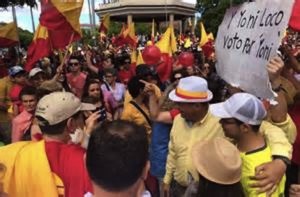 It’s more and more clear that in the country there is a strong desire for anti-PLN change, and that the sudden rise of Solís as representative of that change in reality was an effect of the fear campaign against the Broad Front. However, it’s probable that after April 6 the extent of the PAC’s will and capacity for change will very quickly be put to the test.
It’s more and more clear that in the country there is a strong desire for anti-PLN change, and that the sudden rise of Solís as representative of that change in reality was an effect of the fear campaign against the Broad Front. However, it’s probable that after April 6 the extent of the PAC’s will and capacity for change will very quickly be put to the test.
AP: Let’s go to the communications media, which had a big impact on these elections and has become a major player in elections across the continent. What role did the media play here?
MFE: The mass communications media played a very important role, dropping all pretenses or images of journalistic objectivity. For example, they put up covers pretending to be news against the Broad Front with things that had no news value, like they published an opinion article against the Broad Front and the illustration they put was a giant drawing of the hammer and sickle. To the point where in the case of the newspaper La Nacion, the star investigative reporter of the paper, Giannina Segnini who has won many prizes, resigned due to the paper’s behavior in this campaign.
Traditionally, La Nación publishes a survey by a company called Unimer, considered the most serious poll of the electoral season. This time they refused to publish the results of the last Unimer poll that showed that the Broad Front would make it into the run-off. This occurred precisely in mid-January and then La Nacion joined a widespread media campaign to lift up the image of the PAC and minimize the Broad Front’s candidate, and the PAC began to rise.
The mass media played a traditional conservative role, of resistance to change. However, the social networks played an important role in communication and interaction to develop the campaign. That helped in the growth of the Broad Front, without a doubt. If the social networks had not existed and we had to rely solely on the information given out by the mass media, probably we would have had a much worse result in the election.
AP: Costa Rica in the last few years has changed its role in the world by opening the doors to US military operations in the war on drugs and signing free trade agreements–in additon to CAFTA, the Transpacific Alliance. Were these geopolitical issues important in the elections and what can we expect in the future in this area?
MFE: In reality, it wasn’t a big issue. The Transpacific Treaty is just now beginning to be an issue since the president signed on and what’s happening is we’re beginning to see opposition from parts of the business sector, especially the Chamber of Industries.
Foreign direct investment in Costa Rica generates many jobs, formal sector jobs that are well paid in comparison to jobs in the internal market. I think–it’s a hypothesis–that a lot of people in the free trade zone voted for the PAC. because the main fear–even above the religious and cultural issues–is losing your job in a country that has high unemployment now. It’s a sensitive thing to think that foreign direct investment, basically U.S., could flee. So with the PAC, I don’t think the geopolitics of Costa Rica will vary, we´ll probably just see some minor adjustments. For example, they proposed to put a new tax on the free trade zone, but with the campaign they went back on it.
AP: You mentioned that the Broad Front is a feminist party and issues of women’s rights came out as part of the fear campaign against it. What impact will the political changes have on women’s rights?
MFE: In truth, I think it will be very difficult, due to the new composition of the Assembly by party. The Broad Front has increased its presence eightfold, but the problem is that even within the Broad Front there are deputies that are conservative on issues of sexual and reproductive rights and the rights of non-heterosexual people.
So I think we will have a more openly conservative Assembly than the previous one, because having brought these issues up explicitly in debate during the campaign mobilized religious groups and people dug in. Costa Rican society continues to be in the majority very conservative on these issues. Within every party, conservative thought dominates. In the Broad Front, if all the deputies acted according to the platform, which is the commitment they have with voters, they should act in favor of women’s rights and human rights in general. But we´ll see how some of the deputies actually behave in practice.
AP: What will be the main issues that confront the country, in addition to employment?
MFE: I think that the issues of inequality and poverty, that have grown with the development model applied in Costa Rica for the past thirty years. Before Costa Rica was a more egalitarian society, without meaning to to idealize it, but now while in other countries in Latin America like Peru, a country with high inequality but that has lowered poverty, in Costa Rica it has gotten worse. The mechanisms for social mobility that permit more equality of opportunities for the people have been dismantled. Poverty is tending to increase–there is an important sector of homes on the edge of poverty, and if inflation increases they will qualify as poor. So the economic situation of poverty and unemployment is the main problem that will confront the country. If there isn’t the will to support the domestic market, to create jobs in small and medium and large companies in the domestic market–not just foreign direct investment–there will be a lot of conflict.
AP: What will be the next step, not only for the Broad Front that has its legislative work, but also for the social organizations that mobilized in the context of the elections?
MFE: In general, I think it will be difficult because we have a very delicate economic environment, with high unemployment and the flow of direct foreign investment has dropped. So that will mean that people worry a lot about losing their jobs.
I think there will be more conservatism in the legislature. My main concern is that the PAC tries to reduce public employment, which is a significant demand of the business sector and international organizations.
The PAC is an unknown factor–it has an important conservative and traditional sector in economics and cultural issues and it also has a more progressive sector. But I think the more progressive part is the minority. I think it will be a hard time for the movements, I imagine that it ‘s going to be more struggle and more confrontation, in a delicate economic context.

